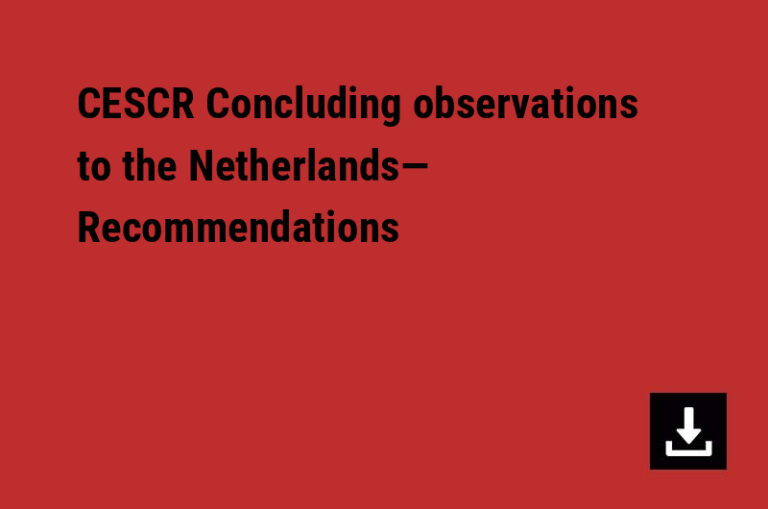After a role at the United Nations, Leilani Farha launched a new effort to protect housing rights.
Your rent goes up, but not by that much. Your missed mortgage payment leads to a penalty instead of foreclosure. Your makeshift hut in an informal settlement is not bulldozed. Your public-housing complex is not sold to an investor group. Your landlord is a person.
This is the world that Leilani Farha is trying to create. As the United Nations’ special rapporteur on adequate housing, she spent the past six years on the front lines of the global housing crisis, seeing homeless encampments in San Francisco, slums in Mumbai, forced evictions in Lagos, and empty investment properties in Lisbon. She’s not the only one who believes these conditions have to change.
Farha, 51, is a human-rights lawyer from Ottawa, and her task, an unpaid position under the umbrella of the U.N. Human Rights Council, was to be a sort of global watchdog on housing issues. After taking on the role in 2014, she traveled through the developed and developing worlds to witness and document the most flagrant violations of international housing standards and then confronted the governments in charge to do something about them. “I don’t know how we’ll solve all of this if we can’t hold someone accountable. And human rights is really clear on who is accountable to whom. Governments are accountable to people,” she says. “I love that clarity.”
But when it comes to adequate housing, fault doesn’t lie with governments alone. In the aftermath of the last global financial crisis, large investors like private-equity firms, hedge funds, and real-estate investment trusts bought up stocks of devalued housing, turning it into one of the most prized assets on the global financial market. These investors now have unprecedented control over housing systems, to the detriment of homeowners and renters alike. The result is both a housing crisis and a human-rights crisis.
And the coronavirus could be making it worse. Unless action is taken soon, the economic instability caused by the pandemic threatens to let even more housing stock slip into the hands of investors for whom profitability is the main priority.
“Housing has become so much a part of the market economy, and has become so privatized globally, it’s no longer thought of as a public good. It’s not thought of as a human right,” Farha says. “I decided I had to change that somehow.”
Now, Farha is launching a fight to make sure the housing catastrophe brought on by the last crisis doesn’t happen again.
Housing has been financialized. That’s the word economists and housing advocates use to explain what’s going on, and it’s the crux of Farha’s fight.
The term has gained currency since the 2008 publication of a research article by the geographer Manuel Aalbers on “the financialization of home and the mortgage-market crisis.” In it, he explains how the mortgage market transitioned from providing homeowners with credit to facilitating global investment through those mortgages. “The financialization of mortgage markets demands that not just homes but also homeowners become viewed as financially exploitable,” he argues. Careless mortgage lending and the selling of that mortgage debt on global financial markets turned homes into numbers on spreadsheets and sparked an economic implosion.
“Financialization became all of a sudden a quite popular concept, not only for housing but for other issues, to say, ‘Okay, what’s been happening in the past few decades?’” Aalbers, now a professor in the division of geography and tourism at KU Leuven in Belgium, tells Curbed. “How are we treating housing? We’re treating it much more as an asset than just as a place to live in.”
And it’s no longer just mortgages that are being bought and sold like stocks on the market. Rental housing, long a local market of small- and medium-size investors, is now seen by large funds and investment trusts as an asset that can provide short- and long-term returns. “If you look in a place like New York, you had the big families that were owning rental housing, but now it’s global funds,” Aalbers says. “So even though it wasn’t peanuts before, now there’s global funds that own hundreds of thousands of housing units around the globe, and, in specific places, these are becoming really big players.”
Vonovia, a German housing company, owns more than 400,000 homes in Germany, Sweden, and Austria as of 2019, and the worth of its real-estate portfolio was estimated that year at more than $57 billion. Blackstone, one of the world’s largest investment companies, is also one of the world’s largest property owners. For a time, it was the biggest residential landlord in the U.S., owning more than 80,000 rental houses and apartments through companies in its portfolio like Invitation Homes, which had bought up housing stock after the last crash. After selling off its shares in the company throughout 2019, Blackstone is estimated to have made roughly $7 billion.
Housing has become so much a part of the market economy, and has become so privatized globally, it’s no longer thought of as a public good. It’s not thought of as a human right.
It’s not necessarily a bad thing that big investment companies and trusts now own a lot of rental property, says Aalbers, but some of their practices are designed to squeeze as much money as possible from their properties and their renters. He points to lax maintenance and increasingly common fees tacked onto monthly rents, including charges for pets, company-installed smartlocks, and even “convenience fees” for using a required online portal to submit the monthly rent. These practices have pushed people to the brink of eviction, foreclosure, and financial ruin.
Farha sees these kinds of actions by private companies as violations of human rights. Holding the companies to account — and pressuring governments to do the same through legislation and regulation — has become her main focus. Farha’s burgeoning effort to fight back against the financialization of housing was the subject of Push, a 2019 documentary from filmmaker Fredrik Gertten that shows her gathering support while also grappling with just how daunting a challenge it is. To make a dent, she realized she would have to build as big of a coalition as possible.
“While we may not have money — most of us working at the local level trying to implement the right to housing — we want to show that we are many, that we are as multinational as the multinationals themselves who are eating up housing in cities across the world,” she says.
Farha spent 12 years as the executive director of the Centre for Equality Rights in Accommodation, a Toronto housing- and human-rights-focused nongovernmental organization, establishing herself as one of the more prominent figures advocating for housing rights in the city. Her influence is clear in Toronto’s recently approved ten-year housing plan, which pledges 40,000 new affordable housing units and acknowledges that housing is a human right.
In 2012, Farha became executive director of the poverty and human-rights nonprofit Canada Without Poverty in Ottawa, where she lives with her partner and two children. Around this time, the then–special rapporteur on adequate housing, Raquel Rolnik, was preparing to complete her tenure, and Farha’s colleagues suggested she apply to be Rolnik’s replacement. Rolnik previously served as director of the planning department for the city of São Paulo and as national secretary for urban programs of the Brazilian Ministry of Cities, and the first person to hold the post, Miloon Kothari, is a celebrated housing scholar. Farha was unsure if she was qualified for the role, but given her training as a human-rights lawyer and her extensive experience in the world of NGOs, Farha decided it was worth a shot. She got the job.
Her mandate, as the U.N. refers to the tenure of the rapporteur, began in June 2014 and quickly encroached on her full-time job at Canada Without Poverty. “When you get appointed, you’re told you need to make a three-month commitment — every year will take up about three months of your life,” she says. “Well, I suppose you could run a mandate that way, but that is not how I engaged the mandate. I mean, it’s taken up 500 percent of my time.”
Even under the auspices of the United Nations, it’s not easy to march into the offices of national governments and make demands. Farha recalls the intimidating meeting she had with the government during her April 2016 mission to India. “There were like 15 officials from various governmental ministries in India sitting across from me,” she says. When she began making her recommendations, including a moratorium on forced evictions of people from homes or occupied land without the offer of legal protection or alternative shelter, she says the officials just laughed. “They were like, ‘Impossible. That’s not going to happen,’” she says. “So that just made me ornery.”
It was a moment that emboldened her to push back. She then raised her other main concerns: the politically sensitive issues of discrimination against Muslims and Dalits, those at the bottom of India’s lingering caste system. “Just knowing that I had to defend people whose human rights were being violated, and that I could stand up to a government and do that, that that’s my job, it really sunk in in India,” she says. “That was 18 months into the mandate when I realized, Okay, I can do this job.”
“How are we treating housing? We’re treating it much more as an asset than just as a place to live in.”
In late 2016, Farha made an official visit to Portugal. Long one of the cheaper destinations in Western Europe, the country suddenly saw tourism skyrocket, and a flood of foreign investment in real estate followed. Housing costs increased steeply, even as wages and income remained flat. “In Lisbon, everything happened in a matter of two or three years in the central areas,” says Simone Tulumello, an assistant research professor focusing on housing policy at the University of Lisbon and a member of Habita, a local housing activist group that lobbied for Farha to visit Portugal.
Farha’s report on her visit was critical, highlighting issues like unregulated short-term rentals, the lack of social housing despite a high poverty rate, and the informal settlements and tin shacks where Romani and people of African descent had been forced to live. She urged the government to take decisive action. “It was a year in which, politically, things mounted. Social movements grew very fast in their visibility and capacity to mobilize, and you also had this idea of a housing crisis in the mass media, which it wasn’t before,” Tulumello says. “So in 2017, the government says, ‘Okay, we have to step in.’”
That summer, Portugal’s first national housing law was proposed in parliament. Based on Farha’s recommendations, a key piece of the law ensures the right to housing. It was enacted later that year.
In early March, Farha was in Geneva to make her final presentation to the U.N. Human Rights Council. She took the dais to present her findings from the two country visits, to Nigeria and France, she had made during the previous year.
“After six years of my tenure, I have this to say: We should be ashamed. How is it that we’ve allowed things to get so completely out of hand?” Farha blasted states for allowing the affluent to take over land and housing, for evicting people without providing alternative shelter, for ignoring the global growth of homelessness. “Yes, we should be ashamed. But we should use this shame to change things — to fundamentally shift how we view these violations and how we view housing and housing systems,” she said. “I can report with some optimism that this shift is afoot. States are starting to realize that the status quo is neither sustainable nor acceptable. But many more states and cities must join.”
Farha’s remarks were received with diplomatic platitudes that suggest little will change, but the coronavirus pandemic has made this fight even more urgent. As job losses mount, concerns about missed rent and mortgage payments are rippling around the globe. With most governments ordering their residents to stay at home, housing is intimately linked with the pandemic.
As Farha finished her rapporteurship, she launched a new effort to counter the commodification and financialization of housing, building off a set of guidelines on the implementation of the right to housing that she developed for national governments. She named her initiative the Shift and is partnering with the international association United Cities and Local Governments and the U.N.’s Office of the High Commissioner for Human Rights to work with officials around the world to enshrine the right to housing in local and national law. The mayors of Barcelona, Berlin, New York, and London have already joined.
The first steps of this project will be to translate the right to housing guidelines to apply to municipal policies and local agencies in a few Canadian cities. These efforts might take the form of city-council resolutions, amendments to the city charter recognizing housing as a human right, and community working groups advising policy-makers and developers on housing projects. Farha and her partners are currently identifying the first four cities for the pilot project.
The economic shock of the pandemic could re-create conditions in the housing market that led to the mass buyoff of housing during the last global financial crisis, she says, spurring a shopping spree by private-equity firms and real-estate investment trusts. And it could start sooner than many people expect. “This might happen in a month, two months, three months maximum, this purchasing of property, the devaluation. But people are not talking about that far into the future; people are talking about this week. What’s going to happen this week? What’s the death toll today? This hour?” she says. “So I’m trying to figure out how we can have that forward-looking conversation.”
Aalbers is equally concerned and worries that the pandemic will only worsen conditions for renters as rental stock is bought up. “The supply of housing is not increasing, so when the crisis is over, whenever that will be, new construction will have been limited for a while,” he says. “Investments take a while to pick back up again, but the demand for housing is still there, and the demand for rental housing is only increasing, which means that, actually, rental housing is going to look really good as an investment.”
“Yes, we should be ashamed. But we should use this shame to change things — to fundamentally shift how we view these violations and how we view housing and housing systems.”
He says there are measures governments can take now to avert some of the housing devaluations that may lead to homes and apartments being put on the market. One is to provide income support to help people cover their rents. “The same, if people are still able to pay their mortgages, they’re less likely to be foreclosed upon and then bought up by these big investors,” Aalbers says. Governments may even be able to use existing anti-monopoly laws to preclude investors from buying so much that they dominate the rental market in specific areas or price ranges. Other policies can be put in place to curtail prospectors by prohibiting the renting of newly built homes, as Amsterdam has tried. Or, he says, countries may even want to consider freezing sales of property altogether until conditions stabilize.
Quick action could make an impact. But Aalbers also knows that the gears of global finance are hard to slow. “Especially for these investors that are more risk-taking, they will definitely see the crisis as an opportunity,” he says. “This is ingrained in the DNA of these companies.”
The pandemic is only adding to Farha’s sense that hers is a necessary struggle. “One of the things it’s shown me is how incredibly important the right to housing is at the local level. I don’t think there’s been such a stark representation of how important homes can be in terms of life and death,” she says.
The Shift, Farha says, will have to start now to “make sure that this time around, unlike in ’08 and ’09, our eyes are wide open, and we are doing everything we can to keep those big financial actors from swooping in and taking up all the property.”



